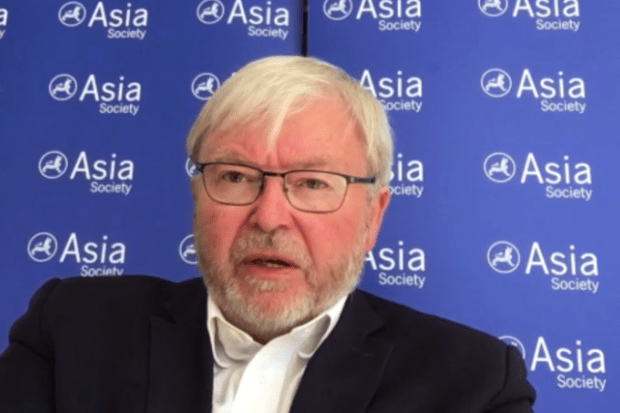While Australian universities must “radically diversify” from China as a source of new international students, they must also work harder to maintain contact with the old ones, according to former prime minister Kevin Rudd.
Mr Rudd, who also served as foreign minister and as a Beijing-based diplomat, said relations with China had hit a new low with the 16 September announcement that Australia planned to obtain nuclear-powered submarines.
The announcement mars hopes of a post-Covid recovery in flows of students from China, he warned. But it also increases the rationale for nurturing relations with hundreds of thousands of graduates of Australian universities who have gone home to China.
Mr Rudd said that even after Covid had suppressed international enrolments, Australia still had more than 150,000 Chinese enrolments. “Millions of members of the Chinese elite have been educated here,” he told a seminar organised by the University of Melbourne’s Centre for the Study of Higher Education.
“[Their] soft power influence…is significant. Such folk need to be carefully harnessed, having returned to their country of origin. And that can be done in a way which is politically and diplomatically inoffensive, and not a problem for them.”
The new “Aukus” alliance of Australia, the UK and the US, whose first major project is the development of the submarine fleet, has provoked outrage in East Asia. While the press conference announcing the new pact made no mention of China, the deal is widely perceived as a response to Beijing’s ballooning regional influence.
“Such a move will potentially make Australia a target of a nuclear strike,” China’s nationalistic tabloid The Global Times warned.
Mr Rudd said the announcement would exacerbate the “trend line” of plummeting Chinese enrolments since 2019. “The way in which that has been communicated to the world, and the tone in particular, will simply reinforce that trend. The trajectory of the Australian-China relationship renders that slice of the [international education] market exceptionally vulnerable.”
But if the “atmospherics” of the relationship were to improve, Chinese alumni of Australian universities would be a “powerful force…to renormalise the idea of coming to Australia in significant numbers to study”, he said. “In the meantime, they need to be kept on the boil – not in the freezer.”
Mr Rudd said that as foreign minister, he had made alumni relations a “performance criteria for ambassadors”, partly to recoup Australia’s investment in scholarships for overseas students. Stronger alumni relations would also resonate with the Chinese cultural affection for networks. “It’s seen as a valuable professional and personal development opportunity to meet alums from elsewhere in university, and from other years.”
Mr Rudd said US institutions such as Harvard, Columbia, Princeton, Yale and Duke were “meticulous in the husbanding of their alumni networks, in a manner which would put practically every Australian university to shame. It is not an art,” he told the symposium. “It is a science.”




